Road tripping is in our blood. The kids affectionally call it, “Millering” which is defined as a very long drive (hours to months) in which there’s no real destination, but adventure is at every turn. When the first kid asks, “Are we there yet??” All we have to say is, “Nope, we’re Millering,” and they won’t ask again, for months, if necessary!
I had the realization recently that 2013 is the “Year of the Road Trip” for our family. Is that on the Chinese calendar? It should be, for us. We rang in the new year in the middle of a month long road trip the length of Borneo. February found us cruising the south coast of Western Australia and camping the National Parks. Then we took a six month spin through New Zealand in an RV. By the time this article is published we’ll be somewhere in the red heart of Australia on an Outback road trip of epic proportions. We’ll end the year with a cross-continental jog across North America. We might just log more linear miles this year than we have in any other year of our travels.
Looking to rent an RV? Search for campervans and RV’s across the world. |
We’ve road tripped on bicycles across Europe, in buses across Southeast Asia, in a van the length of Central America. I have to say that our preferred vehicle for the longer term road trip (I’m talking weeks to months here, not a long weekend) is an RV. It’s lovely to be able to roll out of bed and into the drivers seat. Home goes with you and accommodation is never a crisis.
Pros & cons
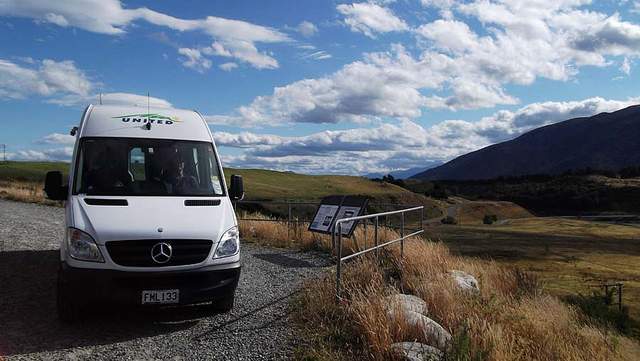
Of course there are two sides to everything! RVing is so convenient in so many ways:
- Your home goes with you, eliminating that unsettling change of accommodation every night.
- You can cook, accommodating picky eaters and eliminating the food crisis.
- Costs may be reduced by both of the above.
- You have transportation, no need to rent a car.
- No packing and unpacking every day.
- You don’t have to stay in the house with that certain relative.
But there are a few cons:
- RVing can be isolating; you’re not necessarily eating out, hanging out in hotel common rooms, or enjoying the routine interaction that comes with other sorts of travel
- Dump stations. That’s all I’m gonna say about that.
- Rainy days. Six people. 156 sq. feet. Use your imagination.
- You think it’s cheaper, but really, I’m not so sure (keep reading).
So let’s talk about some of this, shall we? What should you consider if you’re planning an RV trip?
Type of rig:
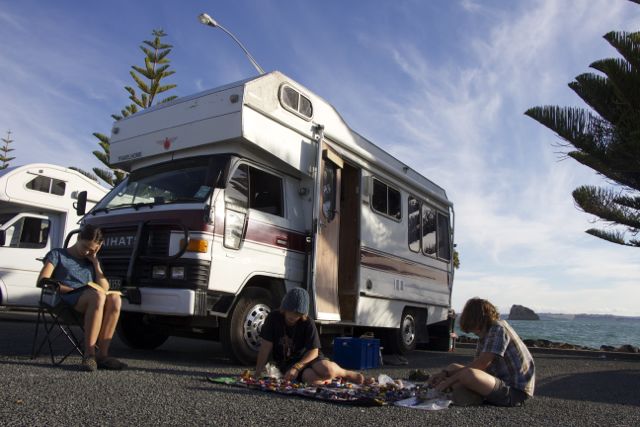
Five seconds of online research and you’ll have a headache over this. Instead of diving into the fray of Class A or Class C, slide or no, tow behind or drivable, gas vs. diesel, let me ask you a few questions:
1. What kind of trip are you taking?
- One where you drive a lot?
- One where you essentially park and use the RV as a base to explore an area?
I ask this because if you are planning on moving forward a lot, then an all in one is easier. If you’re going to use it as a base and do a lot of day trips, then one you can drop off and leave, driving the smaller vehicle around for touring, is easier.
[social]
2. Where are you going?
This matters. If you’re going to be across the USA and back on paved roads where the sight of a nice big fat RV isn’t going to raise an eyebrow, that’s one thing. If you’re driving down into Central America, a big fifth wheel will come apart at the seams from the torque of the rough roads (I’ve seen it first hand), and the newer it is, the bigger target is painted on your ass for bandits. I have stories.
3. How little can you live with?
- The smaller the rig, the cheaper the fuel.
- You’ll pay less for camping in a small rig than you will one of the great big ones.
- It’s easier to “stealth camp” in a smaller vehicle.
- Maneuverability. It matters.
We had a 30 ft. Winnebago once. Nothing but trouble. We just spent 6 months in a 21 ft Daihatsu. Not one single bit of trouble. The rig you choose, it’s size, fuel efficiency, and maneuverability matter more than you can possibly account for on paper. The right vehicle can make or break your trip!
Where to go
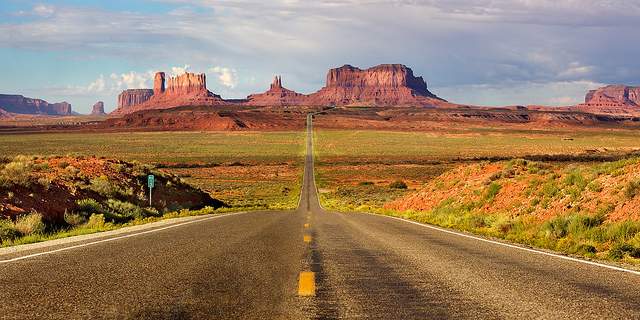
Where you are traveling by RV will make a huge difference in what you choose for your rig as well as how you plan your journey. The USA, Canada, Australia and New Zealand are classic places for a long term RV trip. These countries are set up for touring, and road tripping is a long and venerable tradition.
RVing is fast becoming popular in Europe as well. The infrastructure is good, it’s easy enough to do, and there are more campgrounds than you can shake a stick at. Think carefully about what you’re driving. I would NOT want a big rig in Europe, known for it’s idyllic postcard medieval style towns with narrow, winding, cobbled streets.
In Southeast Asia, RVing isn’t even heard of. We saw one intrepid couple, in Thailand, with a 4WD beast of a rig that they’d driven overland from Switzerland, through Mongolia and down through China. They were an anomaly, and they were afraid to leave their rig anywhere.
Central America is fantastic for road tripping, and we’ve done it several times. I wouldn’t even consider taking anything bigger than a Class C, and even that will be an adventure. As a kid I remember spending three days digging one out of a place we’d gotten sunk in sand. We’ve met a few folks who’ve been liberated of their rigs and left standing roadside after having been cased by bandits at a campground. Less is more when traveling in places where your “more” contrasts starkly to their “less.” Take the smallest, oldest junker you can find, sink your money into upgrading the engine components, and pack your sense of humor.
Where you plan to travel will have a huge impact on your RV choice.
Rent vs. buy
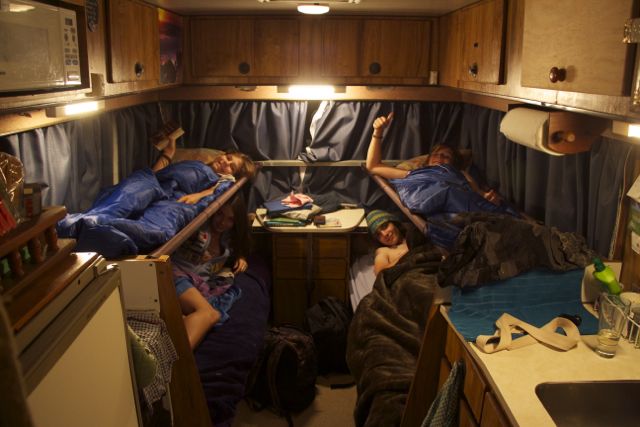
I’m fast becoming a hater of RV rental schemes. They’re just too danged expensive, especially for those of us who want to take a real trip and not just a two week vacation.
If you do go the rental route, read the fine print. Often if something goes wrong you’ll have to return the beast to the point of origin to get them to cover the repairs, handy as hell when you’re 1000 km away when it breaks down. This happened to friends of ours in NZ with their rental.
Carefully do the math with a rental. Insurance is usually a hefty extra (as much as $40 a day), and of course you’ll have fuel costs and camping costs on top.
If you’re planning a trip of several months (and I sincerely hope you are!), think about buying a used RV, or if you’re willing to really think outside the box, arrange a private rental. I’ve written about how we managed that in a (very long and detailed) post about RVing in New Zealand. Check it out. Email me if you have questions.
Hidden costs
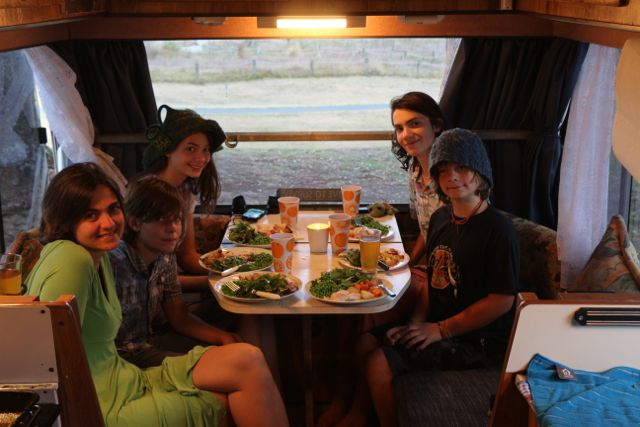
At first glance it seems like an RV trip will be a cheap way to go: car and lodging all rolled into one. Depending on how you’re used to traveling, it might be. But then again, it might not!
Here is a breakdown of costs based on our recent experiences:
- If you rent, plan on $250 a day for a Class C
- Add a tank of gas per day $100 (depending on local fuel rates, of course)
- Campsite rental… $25-50 for an electric site for a rig, most (western) places (more if you’ve got six people, like we do!)
We’re up to nearly $400 a day (this is for a family of 6). Is that cheaper than the other ways you can do it?
It’s one of my favorite ways to travel! It is, however, one of those things that seems like it’s going to be “cheap and easy” when in fact it requires careful planning and a realistic look at the budget.
There are RV buy back schemes (especially popular in Europe) that can be a better way to go and cheaper than a long term rental.
If you buy or arrange a private rental, it will definitely be cheaper, but then you’ll have hidden costs in the form of registration, licensing, inspections, and maintenance to budget for.
Does it sound like I’m trying to dissuade you from RVing? Nothing could be further from the truth!! It’s one of my favorite ways to travel! It is, however, one of those things that seems like it’s going to be “cheap and easy” when in fact it requires careful planning and a realistic look at the budget.
Have you taken an RV trip? What were the pros and cons? What surprised you? What did you love? What advice do you have for others considering the same?
To read more about road tripping, check out the following articles and resources:
- If you plan on renting, use this page to search for campervan rentals across the world
- Indie Travel in America – Road Trip Style
- Four Fantastic Foodie Road Trips in the US
- Rock and Roll Road Trip
Photo credits: thedailyenglishshow, Bettina Woolbright, all other photos courtesy of Tony Miller and may not be used without permission.
